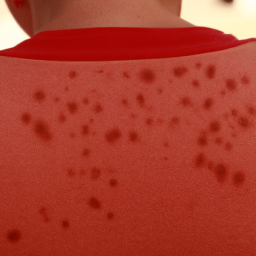Good Monday morning. Breaking Overnight — “Chiefs win Super Bowl over 49ers with Patrick Mahomes TD pass” via The Athletic — The Kansas City Chiefs secured a victory in the Super Bowl with an impressive touchdown pass by Patrick Mahomes. While the game made headlines, the dangers of sunburn and its long-term effects often go unnoticed.
Sunburn may seem like a temporary inconvenience, but the damage it causes to skin cells can be permanent. Prolonged exposure to the sun's harmful UV rays can lead to serious long-term consequences, including an increased risk of skin cancer and premature aging of the skin.
By the time sunburn becomes visible on the skin, the damage has already been done. The skin's natural defense mechanism, melanin, is activated to protect against UV radiation. However, excessive exposure overwhelms this defense, resulting in sunburn.
After bathing, gently pat yourself dry but leave your skin slightly damp to help trap the moisture as you apply a moisturizer. It's best to choose a moisturizer specifically formulated for sunburned skin to soothe and hydrate the affected areas.
Avoid using petroleum jelly, benzocaine, lidocaine, or butter on sunburned skin as they can worsen the symptoms and hinder the healing process. Instead, opt for products recommended by dermatologists or natural remedies to alleviate discomfort.
Hydration is crucial for sunburn recovery. Drink plenty of water and use a moisturizer to prevent excessive dryness and flaking. Staying hydrated helps the skin heal and maintain its natural moisture balance.
Dermatologists suggest several home remedies for sunburn relief, including aloe vera, hydrocortisone cream, soy-based products, cool compresses, cool baths, and moisturizers. These remedies can help reduce inflammation, soothe the skin, and promote healing.
In a recent study conducted by Northwestern University, scientists have developed synthetic melanin that mimics the natural melanin found in human skin. This breakthrough could potentially provide better protection against UV radiation and reduce the risk of sunburn.
It is important to be cautious after getting sunburned. Avoid using petroleum jelly or other oil-based ointments as they can block the skin's ability to cool down and heal. Additionally, dehydration can exacerbate sunburn symptoms, so make sure to stay hydrated.
While having one sunburn does not guarantee the development of skin cancer, it does increase the risk. Dermatologist Dr. Paragh emphasizes the importance of sunburn prevention as a proactive step to reduce the chances of developing skin cancer.
Taking preventive measures, such as using sunscreen, seeking shade during peak sun hours, and wearing protective clothing, can significantly reduce the risk of sunburn and its long-term consequences.
Regular skin check-ups with a dermatologist are crucial for early detection of any potential skin issues. If you notice any changes in moles or unusual skin growths, seek medical attention promptly.
Sunburn should never be taken lightly. Understanding the risk, practicing sun safety, and promptly treating sunburned skin are essential for maintaining healthy skin and reducing the chances of long-term damage.
Protect your skin from the harmful effects of the sun. By adopting sun-safe practices and promptly addressing sunburn, you can enjoy the outdoors while minimizing the risk associated with excessive sun exposure.
